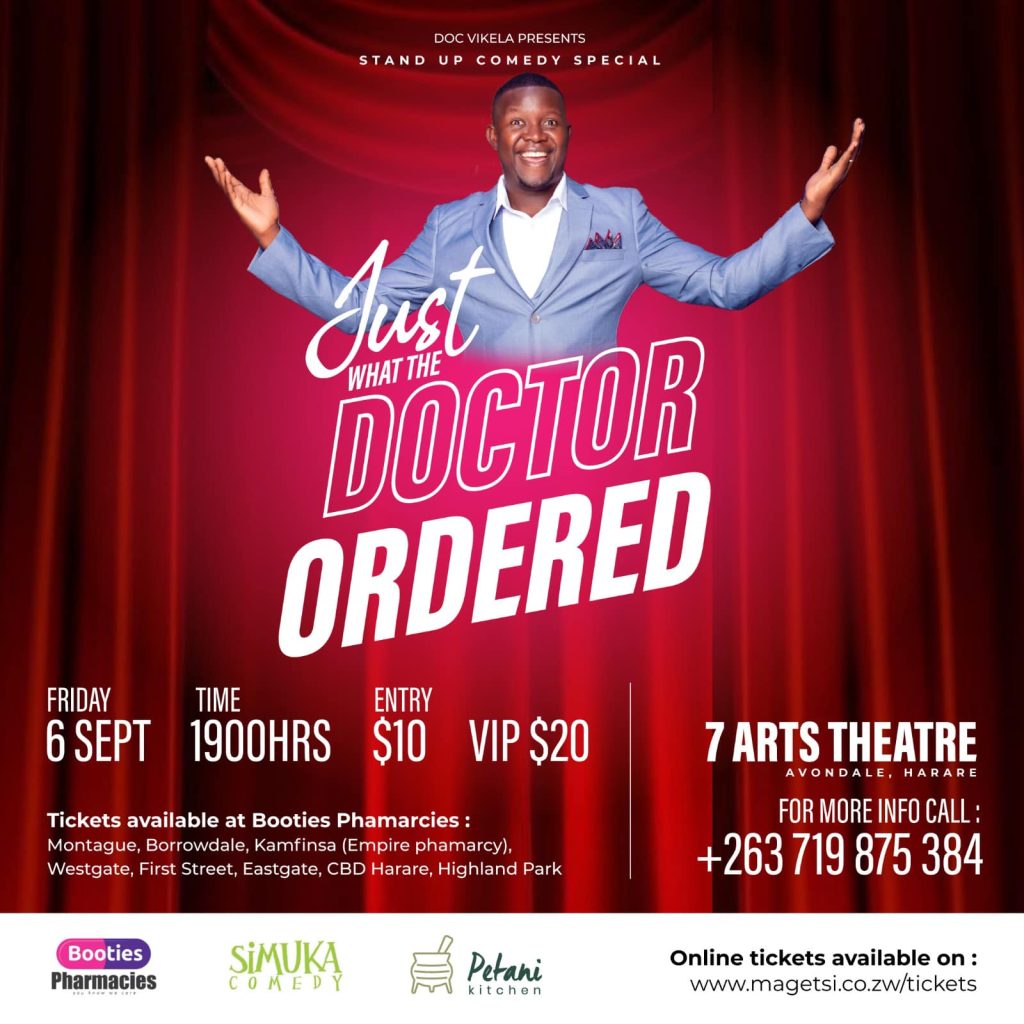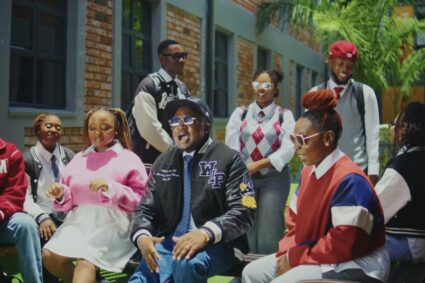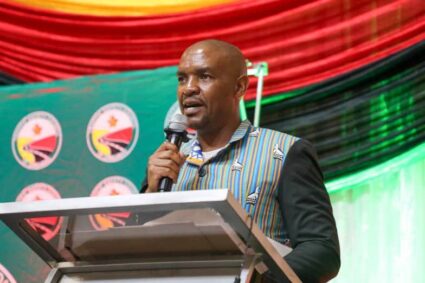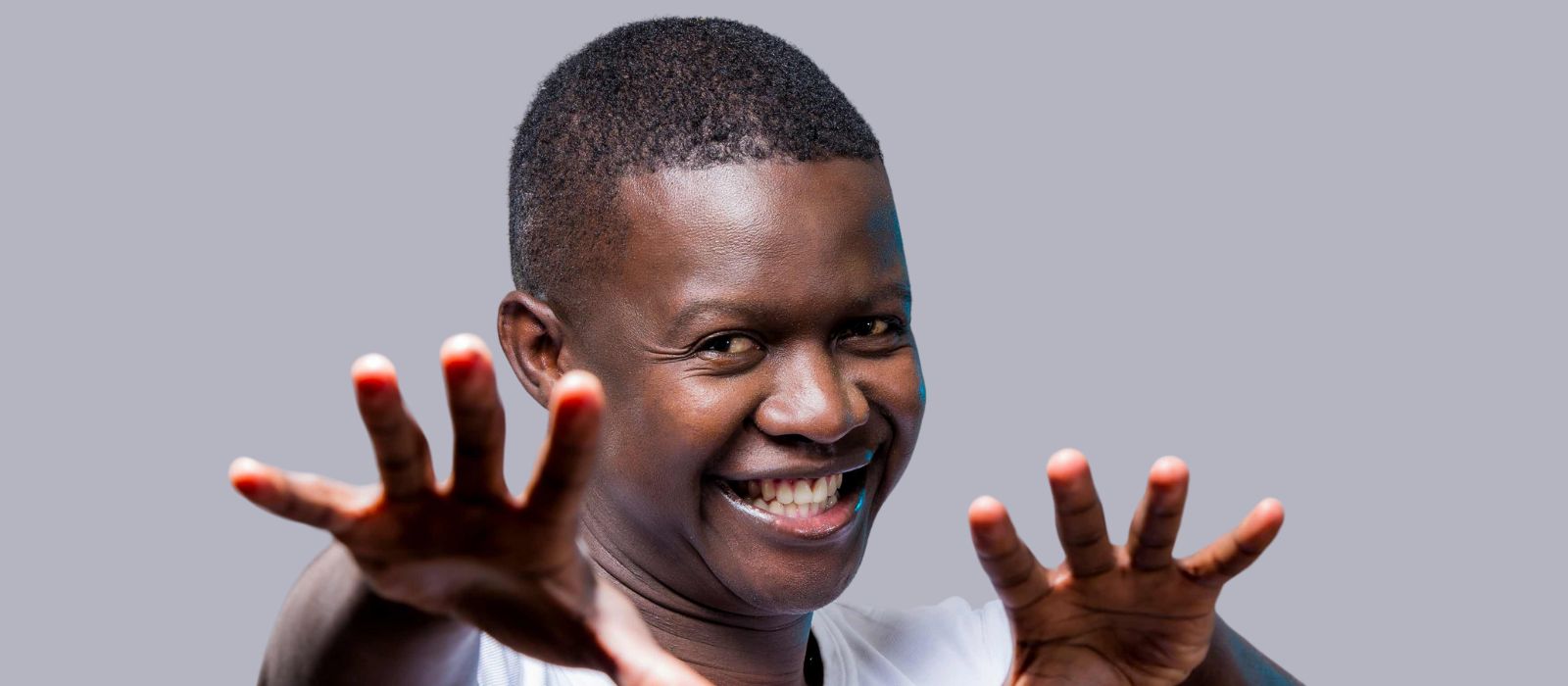
Few comedians have achieved the level of gaining success and recognition in Zimbabwe. What sets apart most comedians from each other is mastering the art of making money out of your art and being consistent in your craft.
Consistency refers to an artist’s ability to maintain a recognizable and coherent style, approach, or quality throughout their body of work. Within the Zimbabwean comedy fraternity. Doc Vikela has translated his body of work into a distinctive comedic voice that blends razor-sharp social commentary, cultural insight, and universal humor.
Born Victor Mpofu, Doc Vikela is set to host his ‘Just What The Doctor Ordered’ stand-up comedy show on the 6th of September 2024 at 7 Arts Theatre, Harare from 6pm.
My Afrika Magazine reporter, Shingirai Manyengavana (SM), had an exclusive interview with Doc Vikela (DV), where he shared his two cents not about his journey but his thoughts on exploring the evolution of his comedic style and thematic focus, his approach to continuously challenging himself and social commentary in his work, and supporting the creative industries in Zimbabwe.
SM: What inspired the themes and social commentary you’ll be exploring in your upcoming show? How does it build upon or depart from the style and subject matter of your previous work?
DV: I’m a satirist by orientation, an entertainer and humourist. My social commentary is based on things that are the norms of society at a particular given time. And this show tracks my journey, not per say tracking events but tracks my journey in terms of the growth that I have had along the way.
So, I’m not per say departing from the subject matter or style of my previous work but there’s maturity in delivery, there’s maturity in the dissection of stories, there’s maturity in every essence of the story telling that I will be doing on the 6th of September 2024.
SM: As an established comedian, how do you continually challenge yourself to evolve your craft and keep your material fresh and relevant? What’s your creative process like when developing new comedy bits?
DV: As a comedian, staying relevant means always having fresh material. I keep my content updated by reading widely because the world changes every day, and there’s always new news. What informs my future is shaped by my past experiences.
My creative process involves borrowing ideas from other genres, not just comedy. I look at how songwriters create their music or how filmmakers develop scripts. I ask myself: What was their thought process? How can I tell my story uniquely on stage? For instance, when I study a poet, I pay attention to how they deliver their lines and the emphasis they use. I also focus on research to create stories based on my life and the things that affect me and my surroundings. This helps me stay fresh and relevant.
With my years of experience in comedy, many of my new material ideas come from conversations with friends, crew members, and everyday observations. I do a lot of observational comedy, so I notice the things happening around me. From these observations, I develop ideas and take them into the creative process, refining them until they shine.
SM: Your comedy is known for its sharp social and political satire. How do you walk the line between humor and pointed critique in a way that engages rather than alienates your audience? What responsibilities do you feel comedians have in this regard?
DV: As a satirist, it’s always tricky to find the right balance. There’s a very thin line between humor and insults, and it’s important to stay on the right side of that line. Humor and insults are not the same, and I make sure to be well-informed and thoroughly research my material. This helps me keep track of what I want to deliver.
There’s a certain joy in mockery, but the real challenge is to be funny. Being funny requires discipline and a clear approach that brings out the best in my material. I believe every comedian has a responsibility to stay informed about what’s happening around them.
For example, if I want to joke about someone like Mutsvangwa and his comments, I need to understand his background and history. What has he experienced that might lead him to say those things? How has he transitioned from being a liberation war figure to a member of the ruling party? All of this context helps me create jokes that are informed and thoughtful, rather than just repeating what others say.
SM: Many of your most iconic bits touch on very personal experiences and vulnerabilities. What is the role of personal storytelling in your comedy, and how do you decide what to share on stage?
DV: I believe the best comedians are those who can tell stories that come from the heart—stories about their passions and experiences that shape their lives. When you speak from the heart, you create a genuine connection with the audience. If your material feels forced or disconnected, the audience may struggle to relate to you.
The realism in my stories, including my vulnerabilities, helps create a narrative that resonates with people. They might laugh at my pain, but in doing so, they recognize their own struggles. Comedy often involves laughing together at the challenges we all face, whether personal or universal.
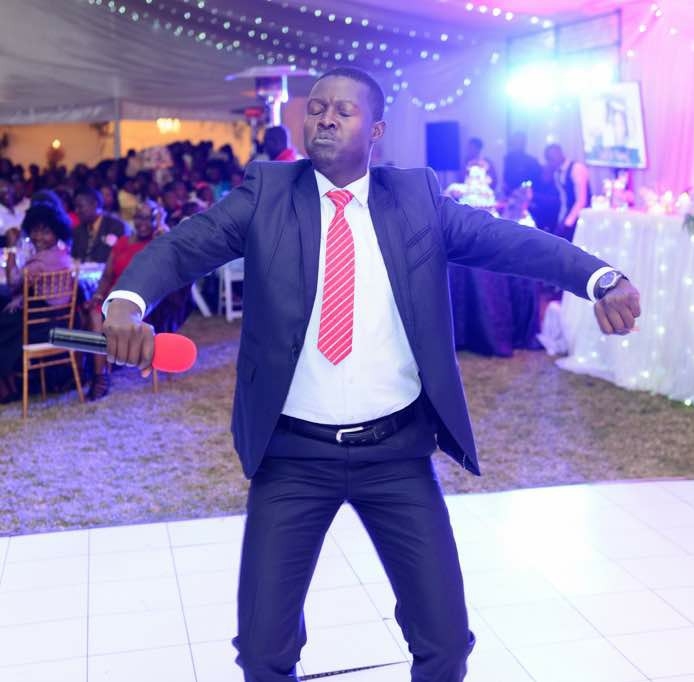
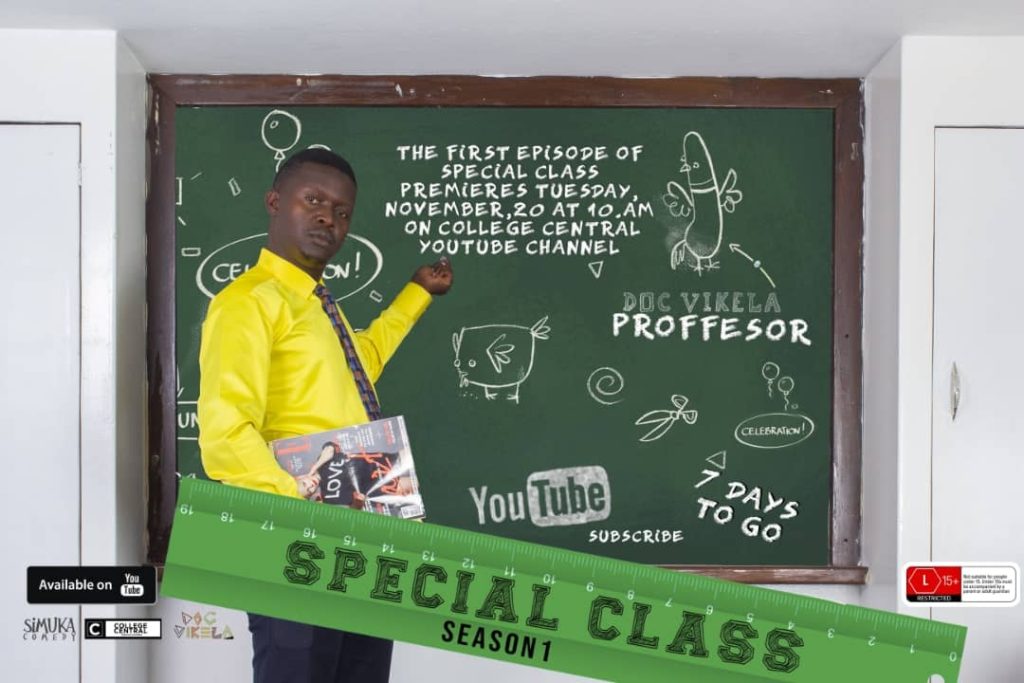
When I share my experiences and vulnerabilities, I aim to build a bond with the audience. I want them to feel that they are not alone in their struggles. We can’t ignore these issues; they are part of our shared experience.
I don’t choose what to share; my material guides me. If I’m talking about marriage or why I wear a certain scarf, I make sure to express those thoughts sincerely. My scripts dictate what I share, based on what feels right in the moment. Ultimately, it’s about being authentic and allowing my true self to shine through in my comedy.
SM: In an era of increasing polarization, how do you aim to create a sense of shared humanity and laughter across diverse audiences? What do you see as the unique power of comedy to bridge divides and promote understanding?
DV: It’s never easy, especially in a world where polarization is so strong. If you say the wrong thing, cancel culture can come after you. For example, I can’t joke about places like KwaNandi or KwaTerry because people who support either side might think I’m being disrespectful. My goal is to provoke thought and conversation, not to offend.
That’s why I focus on my own experiences and struggles. When I talk about politics, I relate it to how the economy affects my life. This personal approach helps me navigate the tricky boundaries of comedy.
I believe the best comedians tell stories that are close to their hearts—stories about their passions and life journeys. When you speak from the heart, you connect with the audience. If your material feels forced, the audience may struggle to relate.
The realism in my stories, including my vulnerabilities, creates a narrative that resonates with people. They may laugh at my pain, but in doing so, they recognize their own struggles. Comedy is often about collectively laughing at our shared experiences.
By sharing my experiences, I aim to build a bond with the audience. I want them to feel that they are not alone in their struggles. We can’t ignore these issues; they are part of our lives.
I don’t choose what to share; my material guides me. Whether I’m discussing marriage or why I wear a certain scarf, I express those thoughts sincerely. My scripts dictate what I share in the moment, allowing my true self to shine through in my comedy.
SM: Your live shows are renowned for their high energy and interactive rapport with the audience. Can you share any insights into your approach to building that dynamic connection with your fans?
DV: I’ve always been an energetic comedian who thrives on audience interaction. I believe that comedy should be a two-way street. When I perform, I want to engage with the audience, not just deliver my routine like a parrot. I want to know who they are and create a connection because I’m sharing a part of myself with them.
This interactive approach is a key part of my stand-up. It enriches my material and makes each performance feel like a unique, live event. Sometimes, when you stick too closely to your script, the audience can lose interest. They’ve paid to be there, so I want to make them part of the experience.
I often say, “What the doctor ordered” isn’t just about my material; it’s about the audience’s experience too. I want everyone to feel involved and have a conversation with me. This connection makes the performance more enjoyable for both me and the audience.
SM: As an established comedian who has achieved tremendous success, what advice would you offer to up-and-coming comedians who are trying to find their authentic voice and breakthrough in the industry?
DV: My advice is simple: get good, get seen, get paid. Let’s be real—you can’t find your authentic voice without putting in the work. You need to practice, write, and rehearse. Do open mics regularly.
The issue with many young comedians is that they see a flyer for a show and expect to jump on stage without any experience. You can’t go from your comfort zone straight to a prime stage. You have to earn it.
So remember, whatever you want to do in comedy, follow this slogan: get good, get seen, get paid.
SM: Looking ahead, how are you hoping this new show will push the boundaries of what audiences have come to expect from your comedy? What creative risks or unexpected directions are you exploring?
DV: My main goal is to open new frontiers next year. I want to tour Europe and America. This upcoming show is going to push boundaries. It’s going to be no-holds-barred, and I’ll be throwing punches left and right. I won’t be holding back at all.
Some people might think I’m insulting them, but my comedy is about satire. It highlights things we often overlook or consider normal. I’ll tackle various topics, even touching on religion, to spark thought and conversation.
In short, audiences can expect a show that showcases a level of brilliance that hasn’t been seen before. I’ve been in this industry for a long time and have worked hard to mentor young comedians to help the industry grow. Now, as I step onto this global stage, I’m ready to show what I’ve been teaching. Let’s make this happen!
SM: As an introduction for our readers who may not be familiar with your work, can you tell us a bit about your comedic journey so far? What first sparked your passion for stand-up, and how have you evolved as a performer over the years?
DV: I’ve always wanted to speak in front of people for as long as I can remember. As a child, I would stand in the kitchen and tell jokes, acting out little dramas with my brothers. My goal has always been to entertain and make people feel good.
About 15 years ago, during an event in Gweru, there was no MC available, so I jumped on the microphone. I said a few jokes, and to my surprise, people loved it! They were laughing, and that experience fueled my passion for performing. I wanted to share stories, interact with the audience, and let them feel my energy.
When I moved to Harare in 2006, I had a vision of what I wanted to do. Deep down, I felt the urge to teach and nurture others. I realized that for the comedy industry to thrive, we need to support new talent. That’s why I’ve spent so much time mentoring and developing young comedians.
By 2009, I decided to fully commit to comedy. I started performing regularly and honing my craft. Fast forward to 2011, we formed Simuka Comedy. During those years, I did a lot of open mics, especially at Bokappa, which was a great platform.
After that, we opened our own comedy club and began promoting shows. We also held workshops to improve our skills, ensuring that our creative work was strong and effective. Without the groundwork laid by Simuka Comedy, many comedians today wouldn’t believe in the possibility of success.
I’ve evolved significantly as a comedian. Teaching others has helped me refine my own skills, making me a master of joke writing and performance. Now, I feel it’s my responsibility to teach others how to reach this level. Think of it like a master in kung fu, sharing their knowledge. That’s where I’m at now.
SM: If you were appointed as the Minister of Arts, Sports, and Culture, what would be your top priorities for supporting and elevating the creative industries in Zimbabwe?
DV: I would love to be appointed because I believe in the motto: “Get good, get seen, get paid.” If I were appointed today, my first priority would be to create grassroots platforms for the creative sector, including sports, cultural events, and the arts.
Right now, there’s no dedicated institution that teaches comedy. We only have a bit of drama in schools. Every high school should have programs for arts and sports. Just like kids learn soccer after school and get support from the government, we need similar programs for the arts.
As the Minister of Arts, my focus would be on helping young talent. First, we need to help them get good. Then, we need to help them get seen. We could organize competitions with real significance that are aired on national television. Why isn’t national TV covering drama competitions and events like The National Association of School Heads (NASH) games. These platforms are essential for showcasing talent and providing opportunities for young artists.
